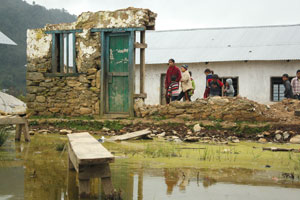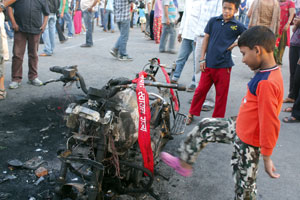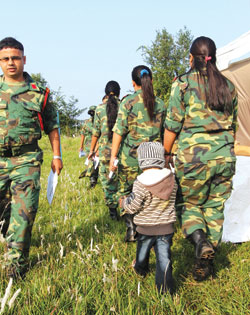 Struggling to move on: A school building in Jorphokari, Panchthar lies in ruins months after the 25 September earthquake |
"An understanding of how to recognise identity, and how to balance diversity, is still unresolved. And what identity means, individual, group, or national?" asked Sapana Pradhan-Malla, a lawyer and recent member of the CA.
The mid-July deadline for approving a national budget will soon be reached, dozens of bills are yet to be ratified, including ones to end caste discrimination and determine reparations for people who disappeared during the war, while 3,100 former rebels in cantonments await word on their reintegration into the national army.
A key demand of the November 2011 peace deal was to integrate former rebels into the national army. Most of the 17,000 Maoist fighters eligible for government-funded 'retirement' packages of up to Rs 800,000 each took the money, while some 3,100 decided to try and join the national army.
Control of the rebel camps, where the fighters have lived since the 2006 peace deal, switched from Maoist to state control in mid-April, but integration into the national army cannot proceed without government approval, said Bala Nanda Sharma, a retired army general and coordinator of the multi-party Army Integration Special Committee.
On 10 May, the committee sent the prime minister a request via the Defense Ministry to clarify how to determine a fighter's age and level of formal education, two deciding factors for joining the army. Should the results of the UN verification process in 2008 be used, or the current levels? Sharma said the committee has so far not received a reply, delaying progress.
 ANURAG ACHARYA A boy inspects the burnt out skeleton of a bike during the three-day banda in May called by Nepal Federation of Indigenous Nationalities |
Robert Piper, the UN Resident and Humanitarian Coordinator for Nepal, told IRIN that integrating the fighters, a key step in honouring the November peace deal, was a "big concern" because having the fighters in cantonments is not "tenable".
There were 38 bills the legislative committee was reviewing before it disbanded, including three considered critical:
� The Bill on Disappearances (Crime and Punishment) Act (2008), which seeks to criminalise the enforced disappearances that occurred during the insurgency period between 1996 and 2006, claiming almost 18,000 lives according to government estimates, set up a commission to investigate past cases, prosecute perpetrators, and provide reparation to the victims.
� The Bill on the Truth and Reconciliation Commission (2007), which proposes establishing a commission to investigate 'gross violations of human rights and crimes against humanity' committed during the conflict.
� The National Dalit Commission Act 2011, which prohibits caste-based discrimination and 'untouchability' practices against Dalits.
"The new government or the parliament can scrap, amend or endorse the bills," said Ek Raj Bhandari, a former parliamentarian and coordinator of the legislative committee that finalises bills before parliamentary endorsement. "Until then the bills will be there in the legislative committee."
Sapana Pradhan-Malla said the impasse heightens political impunity and delays justice to the victims of conflict.
The Disaster Management Act, five years in the making, was scheduled to be introduced shortly in parliament.Andrew Martin, head of the humanitarian support unit at the Office of Coordination of Humanitarian Affairs (OCHA) in the capital, said those plans are now on hold.
"If a large earthquake happens in Kathmandu, government structures are insufficient. There is not enough capacity on disaster preparedness. Changing ministers and political insecurity leave people with a shallow knowledge of preparedness," Martin said.
While 69 of Nepal's 75 districts have local emergency response plans, there is still no plan detailing how international aid workers would quickly get staff and equipment into the country, who would set up emergency hospitals and channel electricity to camps for displaced persons, or how to track families - all points under negotiation.
Three weeks from the deadline for approving the 2013 budget, the NC's Ram Sharan Mahat, warned that political instability will make it difficult to get approval for increased spending without "full political consensus". Mahat, who has been finance minister five times, could only present one-third of the total budget one year due to political stalemate.
"In these cases, we can only pass a partial budget to ensure ongoing activities are not hampered. There cannot be a policy shift or new budgetary programs due to political turmoil, which creates economic uncertainty," he explained.
The 2008-09 budget was delayed by two months, in 2010-11 it was four months late, as was the 2011-12 budget.
Late budgets choke off needed funds for development, said Chandan Sapkota, an economist at the South Asia Watch on Trade, Economics and Environment office in Kathmandu. "A delayed budget means a halt in work due to shortage of funds to pay for workers and materials. This usually leads to liquidity problem and halt in rural development work for several months," Sapkota said.
 KRISHNA SINJALI Former Maoist combatants line up for the regrouping process in Chula Chuli, Ilam in November |
Delivery backlogs caused by strikes in May, coupled with rising fuel costs linked to an ongoing energy crisis and late payments by the state-owned oil company to its supplier in India, increased the World Food Program's transport costs to get emergency food supplies to the mountains in the mid-west and far-west regions by up to 70 per cent in June, said the agency's deputy director in Nepal, Nicolas Oberlin.
A 2009 regional breakdown of the Global Hunger Index, said Nepal's mid-western mountain region had among the highest levels of hunger worldwide, just above the Democratic Republic of Congo in Central Africa.
At present Nepal is divided into five regions from east to west � Far West, Mid-West, West, Central and East - with control held by the central government in Kathmandu.
UN Resident Piper said the rise of aggressive identity-based politics and a recent increase in street violence have been troubling. "Federalism will not go away. This discussion will be revisited and needs to be managed differently," he added.
A community of farmers in Banibhar village, 20 kilometres outside of Nepalganj in western Nepal were asked recently what they understood by the federalist issue holding up the constitution. Kul Bahadur Shahi, 53, asked: "What is a constitution?"
His main concern is how bandas affect his ability to transport produce.
IRIN
Read also:
All politics is local
A democratic jolt, RUBEENA MAHATO
The NC and UML are dominated by failed and ageing alpha males from the past, it's time to make a clean break
Monsoon of the megalomaniacs, ANURAG ACHARYA
A new government made up of old leaders will mean the same old


